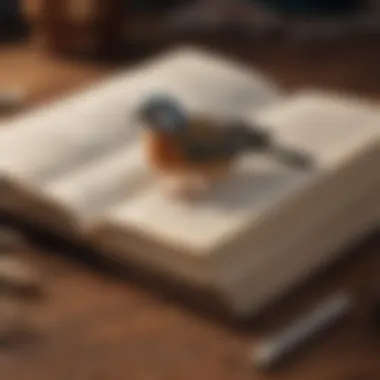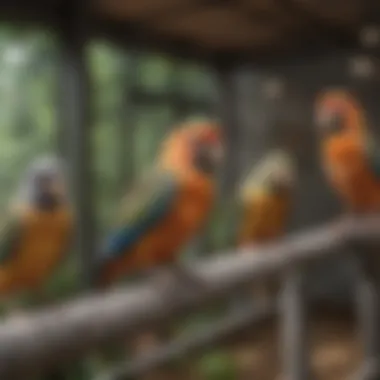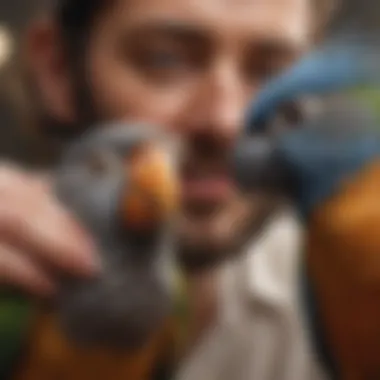Is Having Pet Birds Haram? An Islamic Perspective


Intro
The question of whether keeping pet birds is permissible in Islamic culture involves a multifaceted exploration of religious, ethical, and personal dimensions. People are increasingly drawn to avian companions, attracted by their unique personalities and melodic sounds. Yet for Muslim pet owners, respect for religious teachings shapes their decisions. Careful consideration of responsibilities and cultural contexts is essential.
This article aims to empower those considering pet birds as companions by examining religious interpretations surrounding bird ownership. As we look critically at scholarly opinions and practical guidance, this examination highlights experiences, responsibilities, and emotional dimensions unique to this journey.
Avian Care Basics
To provide a nurturing environment for your birds, understanding a sound care outline is essential.
Importance of Proper Nutrition
Feeding birds a balanced diet sustains their health and well-being. Choices may depend on the species you decide to keep, whether they are finches or parakeets. General necessities often include seeds, pellets, fruits, and vegetables. Each type of bird has specific tastes so it's best to do some research before setting their menus.
Understanding Bird Species and Their Needs
Different species come with different needs and personalities. African Grey parrots require mental stimulation and social interaction. In contrast, budgerigars are more amiable and thrive on companionship, making them ideal for families. Familiarizing oneself with these characteristics not only aids in selection but also enriches the owner-bird relationship.
Basics of Birds Habitat Setup
Setting up an appropriate habitat is vital. A spacious cage, suitable perches, and toys are essential components. Various environmental needs like temperature, humidity, and light should also be taken into account. Distinct species possess different preferences; thus, understanding their native habitats may guide habitat design.
Grooming and Hygiene Tips
Maintaining cleanliness is crucial. Regular cage cleaning stops the spread of bacteria. Birds benefit from occasional baths, which keep feathers tidy and enhance comfort. Introducing small showers or misting can be enjoyable for them while providing necessary hygiene.
Interacting with Your Pet Bird
Interacting forms the core of establishing trust between a pet bird and its owner.
Building Trust and Connection
Birds can be wary. Gentle handling fosters familiarity. Offering treats can help bond, making a bird pair gradual interaction with positive experiences. Finding a consistent routine helps nurture a trusting bond over time.
Training Techniques and Tips
Training takes patience. Using positive reinforcement can elicit desired behaviors. Whether it’s teaching birds to step up or respond to cues, employing gentle methods creates a conducive training atmosphere. Remember that each bird evolves at its own pace.
Fun Activities for Bird Owners and Their Birds
Planning engaging activities optimizes bonding moments. Hiding food puzzles or arranging climbing structures enhances mental stimulation. These activities keep birds active and content while reinforcing the bond further.
Recognizing Bird Cues and Behaviors
Being observant aids in learning when a bird may feel frightened or comfortable. Each chirp or feather ruffle can signal distinct emotional states. Pioneering this understanding can facilitate relationships and care quality.
Emotional Well-Being of Birds
Understanding your bird's emotional health plays a significant role in their daily joy and longevity.
The Role of Play and Socialization
Integrating play into daily routines is necessary. Interacting alongside fellow birds can prevent loneliness, enhancing their quality of life. Creating a dynamic environment introduces enrichment through novelty.
Enhancing Birds' Emotional Health
Attention nurtures well-being. Birds display affection and friendship for caring owners. The connection grows through affection, played attributes numerously seen in creatures, thereby fining a delightful interplay, contributing positively to them.
Assessing Bird Stress and Remedies
Identifying stress can be a subtle process. Changes in behavior, like feather plucking or excessive screaming, can pin point issues. Correct measures like reduced exposure to loud noises or offering a calm corner can alleviate concerns.
Building Strong Human-Bird Bonds
Being engaged from day one accelerates this connection. Seasons spent training, playing, and understanding delivers relations that stand strong over a lifetime.


Bird Health and Safety
Aware assistance mitigates practice of avian care. Understanding health safeguards sustain care plans.
Common Health Issues and Prevention
Common health problems include respiratory issues, obesity, or syntactical problems. Consistency in diet helps ward off obesity, while clean environments can prevent issues proliferation in birds. Watching their diet and habitat will go a long way.
Routine Veterinary Care
Periodic check-ups are advisable to detect problems early. A veterinarian skilled in avian care can provide essential insights, preventative treatments, and valuable health tips.
Environmental Hazards to Avoid
Electronics, toxic substances, and improperly designed cages pose threats. Taking visual scans before accommodating birds greatly minimizes accidents, protecting your pet.
Signs of Illness or Distress
Be vigilant of changes, as pets may signal distress differently. Observing adverse actions like apathy or changes in eating habits mandates discussion with a veterinarian, like to outline treatment plans before any places.
Fun Facts and Quirky Insights
Interesting knowledge often makes the practice joyful. Getting to know birds sourced enjoyment.
Unique Traits of Popular Bird Species
Budgerigars readily adapt to various environments and groups while maintaining friendliness non-negotiable, yet fascinating. Lovebirds possess eusocial connections meaningful for help striving nurturing relation.
Historical and Cultural Significance of Birds
Birds graced human culture since ancient times. Throughout art and literature, they symbolize freedom, hope, and communication, deeply rooted in numerous global leftovers.
Famous Bird Owners and Their Stories
Historically functional figures benefitting relationships with birds appear throughout various writings. Some recognize known individuals establishing standards or meaningful with birds that persisted through ages.
Prelude
The question of whether keeping pet birds is acceptable within Islam merits careful consideration. This topic intertwines various important elements such as ethical treatment, cultural understanding, and religious interpretations. The relevance of this inquiry is heightened by the growing global enthusiasm for bird ownership. Many people view birds as companions that can enhance one’s life experience. Thus, it becomes essential to explore how these views align with Islamic teachings.
By dissecting the diverse perspectives on pet bird ownership, this article aims to provide insights specifically tailored for Muslim individuals contemplating this matter. Spanning centuries, Islamic teachings have provided guidance on animal welfare and can potentially influence the choices made by current and future pet owners.
Moreover, it is crucial to understand responsibilities that come with caring for a living being, ensuring the birds' needs are met. Ethical considerations include not just how one treats pet birds, but also the broader impact of pet ownership on the environment and society.
As this article unfolds, expect to delve into:
- The definitions and implications of haram in Islam.
- Historical and modern cultural attitudes towards birds.
- Scholarly interpretations and relevant religious texts.
In grasping these varied dimensions, Muslim pet owners and aspiring bird parents can make more informed decisions. Consequently, this exploration leads to a deeper understanding of companionship, humanity’s shared bond with nature, and the obligations that accompany pet ownership in Islam.
Understanding Haram in Islamic Context
In assessing the permissibility of keeping pet birds, it is essential to grasp the concept of haram within the Islamic framework. This understanding shapes various interpretations and attitudes regarding animal ownership, specifically birds. An inquiry into what constitutes haram assists pet owners in aligning their practices with the values of their faith. Recognizing the implications of this term will guide enthusiasts and aspiring bird parents in making knowledgeable decisions respecting Islamic teachings.
Definition of Haram
Haram refers to actions or items that are forbidden in Islam. The term is integral in guiding every aspect of a Muslim's life, specifying what is permissible (halal) versus what is unlawful (haram). In matters of animal treatment, haram may evolve beyond merely the physical interaction; it includes the moral and ethical dimensions toward the creature. Keeping pet birds can potentially border on haram if the care is insufficient or if the animals are mistreated.
Islamic teachings advocate a balanced approach to all living creatures. Pet ownership can be deemed haram if it leads to discomfort for the animals, reflecting a lack of proper care or neglect of their needs. Thus, the onus rests on the caretaker to maintain the welfare of pet birds alongside fulfilling their spiritual responsibilities.
Factors Influencing Perceptions of Haram
Understanding haram is complex, influenced by several factors, stemming from religious texts as well as cultural attitudes. For many, the cultural interpretations play a significant role alongside textual faith principles.
- Religious Background: The stake of how haram is interpreted often depends on specific sects within Islam. Different theological backgrounds may yield distinct understandings.
- Cultural Framework: Areas such as the Middle East may have historically different views toward birds compared to Southeast Asia where birds are sometimes seen as symbols of good fortune. Such regional contrasts can shape opinions on the appropriateness of having pet birds.
- Scholarly Discourse: Islam has a rich tradition of debate and scholarly interpretations regarding various matters. The opinions of different scholars concerning animals influence how devotees perceive bird ownership.
This multifaceted evaluation invites pet owners to consider the broader implications supporting their ownership decisions.


Cultural Attitudes Toward Birds in Islam
The cultural attitudes toward birds in Islam are complex and multifaceted. Understanding these attitudes is crucial for those contemplating pet ownership in the Islamic context. Cultural views on birds can significantly influence how Muslims perceive pet birds, encompassing emotions, practices, and community norms surrounding animal care.
Historical Context
Historically, birds have held a unique position in Islam. Various Islamic texts reference birds not only as part of the natural world but also as symbols with deeper meanings. The stories of Prophet Muhammad (peace be upon him) often highlight his compassion towards animals, including birds. For example, there are accounts where he intervened in situations involving the welfare of birds. These narratives have contributed to the perception of birds as creatures deserving care and respect.
In many traditional cultures, keeping birds has been associated with hospitality and the aesthetics of home. In certain regions, decorative birdcages can enliven spaces, serving both a practical need and an ornamental function. This historical interplay reflects a typical admiration. Many birds are also viewed as spiritual beings in folklore, sometimes believed to be carriers of good omens.
Modern Perspectives
In contemporary times, the perspective on pet birds has transformed, reflecting societal changes and advancements in understanding animal needs. Many Muslims view birds as more than just pets. They recognize the emotional relationships that can develop between humans and birds, providing significant emotional benefits for owners.
People today often consider the ethical aspects of pet ownership. Halal practices in pet care are now a growing concern among Muslim communities, prompting individuals to seek ways to properly care for their birds. This includes ensuring cleanliness, providing nutritious food, and meeting the emotional needs of the animals.
Research indicates that owning birds can enhance well-being and bring joy to households. Founded on these insights, many see keeping birds not just as a permissible activity but an uplifting and enlightened choice.
The understanding continues to evolve as more educated people advocate for better treatment and care for pet birds. Despite cultural biases, an increasing number of bird owners actively seek to align their pet ownership with Islamic values of kindness and responsibility.
Islamic Teachings on Animal Treatment
Islamic teachings place a major emphasis on the treatment of all creatures, including animals. These principles manifest compassion and respect toward living beings, forming an essential part of Muslim ethics. Monotheistic beliefs advocate for the necessity of kindness, urging Muslims to develop a conscientious approach for caring for animals, may it be domestic or wild. The treatment of animals, including pet birds, falls under this umbrella. Therefore, first understanding the general principles is imperative, before examining the specific context involving birds.
General Principles of Kindness
Within Islamic teachings, kindness to all of Allah's creations is critical. The notion of rahma, or mercy, serves as a cornerstone in the treatment of animals. The Quran carries several references demonstrating this concept. For example, Surah Al-An'am talks about the significance of treating animals with care and kindness. This emphasis directly relates to the responsibilities of pet owners
- Here are key ethnic principles regarding animals:
- Welfare: Valuing the wellbeing of an animal implies ensuring that they are healthy and secure.
- Feeding: Tamam ensuring that pets receive proper nutritional care aligns with the broader Islamic doctrines.
- Prevention of Harm: No being should suffer; thus, neglect or mistreatment falls against Islamic values.
These rules stem from a recognition that animals have a right to it as any other creature made by Allah. Consequently, having pet birds means accepting the ethical duties surrounding their care and wellbeing.
Specific References to Birds
Birds hold a unique position in Islamic faith. Some Hadith specify numerous respects attributed to their existence. For instance, even the Prophet Muhammad encouraged kindness towards birds. There are narrations where the Prophet spoke against caging birds permanently without reason. These references compel individuals to reflect on how bird ownership practice evolves.
Another important aspect is their natural rights as living creatures. While their beauty and expression also fascinate humans, neglecting these beings, especially in makeshift bird cages, runs not in alignment with Islamic teachings. This hosts a reminder that becoming a pet owner must also include comprehension of what Allah envisions concerning living beings.
Kindness towards birds, as well as all creatures, reflects the compassion inherent in the core of Muslim practice.
To integrate ethical treatment into ownership practices, pet bird owners should appreciate the vocal and active natures in these creatures. Allowing an environment that nurtures their behaviors aligns closely with the factual accounts from teachings.
Observing attentiveness embellished with moral responsibilities is vital for ensuring fertile interaction establishes with these companions as pet birds. Overall, understanding Islamic ideals directly aids one to maintain a nurturing, lawful relationship with birds while promoting higher level of awareness toward their emotional and physical care.
Scholarly Interpretations Regarding Pet Ownership
Understanding scholarly interpretations regarding pet ownership is crucial for anyone considering having pet birds within an Islamic context. This section combines insights from authoritative voices that tackle the deeper implications of bird ownership. They weigh religious teachings against cultural practices while accounting the personal responsibilities that pet owners must uphold. Ultimately, these interpretations guide aspirational bird parents by addressing concerns, enriching the overall experience, and allowing thoughtful decisions among pet owners.
Diverse Opinions Among Scholars
Islamic scholars present a spectrum of opinions towards pet ownership, particularly concerning birds. A significant element in their discussions is the emphasis on animal welfare. Scholars agree that pets require care, compassion, and attention. While some interpret hadiths or Quranic verses as permissive with certain limitations, others impose stricter views against pet ownership if it involves neglect or harm.
Several scholars, such as Sheikh Abdullah bin Bayyah, argue it is permissible, citing the tolerance Allah shows toward living creations. Others have voiced concerns regarding potential neglect due to lifestyle conflicts.
Some key points include:
- Animal Sentience: Birds, like all animals, possess the capability for feeling and suffering. This factor shapes scholarly views on pet ownership.
- A Hadith reported by Abu Huraira mentions that a woman was punished because she imprisoned a cat, illustrating the importance of treating animals with care and respect.
The interplay between ethical treatment and permissible ownership provides a holistic view of the subject matter. In essence, responsible ownership remains pivotal.
Relevant Hadith and Quran Verses
Delving into relevant hadiths and Quranic verses showcases how foundational texts address the philosophies of pet ownership. One poignant example is found in a hadith narrating the Prophet Muhammad’s sentiments about kindness to animals. Such references underline a shared commitment to maintaining their ethical treatment.
The Quran also emphasizes mercy.


- Verse 24:41: Discusses the beauty of living beings which includes birds—hinting to their importance in the creation of earth.
- Hadith: As mentioned earlier regarding the cat and its treatment focuses that harm or neglect reflects on the owner’s moral standing within Islam.
Practical Considerations for Bird Owners
Understanding the practical considerations for bird owners is essential in ensuring a fulfilling relationship between humans and their avian companions. By addressing various responsibilities associated with bird care, potential challenges can also be alleviated. Key elements such as care requirements, emotional health, and a safe environment not only adhere to ethical standards but also enrich the overall experience of owning pet birds. The importance of focusing on these considerations cannot be overstated.
Ethical Responsibilities of Pet Owners
Providing Adequate Care
Providing adequate care for pet birds involves tending to their physical and emotional needs. This encompasses regular veterinary check-ups, appropriate social interactions, and a stimulating environment. Pet owners must realize that birds, like any animal, thrive on dedicated attention and proper maintenance. Ensuring their comfort and wellness translates into a better living scenario for both the bird and the owner.
A significant characteristic of adequate care is commitment. Each pet owner must commit time and resources to regularly clean, interact, and monitor their birds' behaviors. This approach fosters trust and builds a bond that can elevate both the bird's and owner’s quality of life.
However, improper care may lead to health issues and could even result in behavioral problems. Making this choice beneficial requires awareness and proactive involvement from owner's end, which highlights why the practice of providing adequate care is not only necessary, but can also be greatly rewarding.
Ensuring Proper Nutrition
Ensuring proper nutrition is another key responsibility that directly affects a bird's health and longevity. Bird diets are often more complex than many might think, requiring a balanced mix of seeds, fruits, vegetables, and sometimes pellets. A diverse diet prevents nutritional deficiencies that may arise when birds only consume specific food types.
Nutritional considerations impact a bird’s hardiness and vibrancy. Pet owners who prioritize diverse diets witness not only improved physical health but also enhanced overall disposition in their birds. Investing in quality bird food and understanding specific dietary needs according to species can maximize health benefits.
The disadvantage of neglecting proper nutrition may become evident in subdued behaviors or decreased stamina. Therefore, maintaining their dietary needs emerges as a crucial responsibility not just for ethical care but for fostering an energetic and lively pet.
Maintaining a Safe Habitat
Maintaining a safe habitat is vital for bird owners. A secure living environment protects birds from potential dangers posed by household items, predators, and other risks. Factors to consider include avoiding toxic plants and securing cages in safe locations.
Safety measures also cover preventing accidental escape, as pet birds may act unexpectedly, leading to unwanted hazards. Features such as adequate cage size, perches, and toys provide secure areas for play and rest. Adapting these factors according to a bird's needs ensures they remain nurtured and undisturbed.
The distinct feature of this responsibility lies in the ability to observe changes in activity levels and overall well-being in response to environmental conditions. Owners who offer safety notice healthier, more confident birds that feel secure exploring their home space. Ultimately, creating a safe environment profoundly influences a bird's mental and emotional well-being.
Establishing Emotional Bonds
Establishing emotional bonds with pet birds enhances the human-animal relationship tremendously. Birds are social creatures, and by investing time in interaction and training, pet owners can foster trust while simultaneously promoting happiness for their birds. Engaging activities such as talking, gentle petting, or training sessions can help bridge the communication gap between species.
Positive interactions influence behavior significantly and make birds feel valued. These bonds can translate into emotional benefits for the pet owners as well. A well-established companionship can lead to stress reduction, joy, and satisfaction that enriches daily life.
Addressing Common Myths About Birds in Islam
In the discourse about the permissibility of keeping pet birds in Islam, various misconceptions often surface. This section aims to address the most common myths, shedding light on their origins and impact. Understanding these myths is crucial for current and prospective pet owners, helping them make informed decisions aligned with their faith and practices. The resolve of misunderstandings can lead to a more compassionate view towards these creatures, potentially fostering a deeper connection between humans and pet birds.
Misunderstandings About Halal and Haram
A prevalent myth regarding the ownership of pet birds revolves around the notion of halal and haram. Many assume that having any animal as a pet might be inherently forbidden. However, Islamic teachings emphasize the significance of intention and care in determining the permissibility of such action.
For example, if a bird is treated well and is provided with an appropriate environment, it becomes easier to argue for its permissibility. The Qur'an signifies the importance of kind treatment towards animals in verses that underscore compassion. Therefore, owning a pet bird does not translate directly to being haram, but rather hinges on factors relating to the caregivers' actions and the general wellbeing of the bird.
Addressing such misunderstandings contributes substantially to the acceptance of pet birds within Muslim households, where pet ownership can accrue spiritual rewards instead of consequences.
Cultural Biases Against Birds as Pets
Cultural factors play a significant role in how animals, particularly birds, are perceived. In some societies, birds are viewed as unworthy of companionship or holding lesser status compared to dogs or cats. This bias often stems from historical contexts, where birds were primarily utilized for specific utility purposes such as hunting or as a food source, rather than companions.
These attitudes can inadvertently mold opinions about pet ownership. Additionally, the social stigma attached to having pet birds may stem from historical references where poorly kept exotic species faced neglect or abuse. This neglect runs contrary to Islamic teachings, which value the ethical treatment of all living beings.
Ending
The topic of pet bird ownership within an Islamic context holds great significance for many Muslims. Understanding whether keeping pet birds is permissible involves dissecting religious teachings, cultural arguments, and ethical parameters pertaining to animal care. This conclusion encompasses key points and benefits made throughout the article, serving as a guidepost for anyone contemplating having pet birds.
Summary of Findings
Through various interpretations of Islamic texts, scholars illustrate a range of opinions regarding pet birds. The detailed analysis within the article reveals that overall, pet birds may be considered permissible if owners adhere to certain ethical responsibilities. These include providing adequate care, ensuring proper nutrition, and maintaining a safe habitat. Misconceptions regarding halal and haram also arise, underscoring the need for clarity in one's understanding of religious guidelines. Academic and community discussions often emphasize the emotional connections that can foster positive relationships between birds and their owners.
Moreover, the article outlined cultural biases that influence negative perceptions towards birds as pets. Historical context illustrates that admiration for birds exists in Islamic tradition, potentially paving a way to reconsider contemporary views. This insight can inspire pet owners to place greater reflections on their bond with these creatures rather than solely on societal expectations.
Final Thoughts on Pet Bird Ownership
In concluding the discourse regarding pet bird ownership, it is essential to recognize the delicate balance of enjoying companionship while adhering to ethical standards rooted in Islamic teachings. Engaging in this kinship offers both personal joy and opportunities for spiritual reflection.
Aspiring bird owners should abandon any superstitions or preconceived notions, focusing instead on nurturing and respecting these animals. Each relationship between human and bird is unique, and understanding the pet's needs fosters a genuine connection that aligns with Islamic principles. Practical guidance outlined for bird care adds an extra layer for responsible pet ownership. As you embark on or continue your journey as a bird owner, domestic considerations such as legal framework about pet ownership in your area also merit consideration.
Ultimately, acknowledging the importance of mutual respect for all living beings becomes the cornerstone in the journey of keeping pet birds while being a practicing Muslim.















